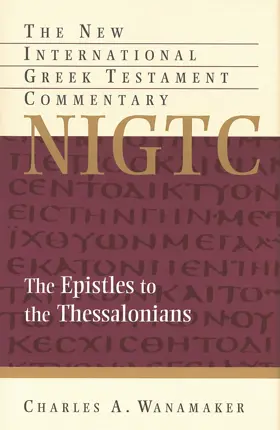

The Epistles to the Thessalonians
in New International Greek Testament Commentary
The letters of Paul to the newly founded Christian community at Thessalonica hold a special place within the Christian tradition as possibly the earliest extant Christian writings. They are also of special interest not only for their theological value but for their sociological context. Among the communities established by Paul, the church at Thessalonica appears to have been the only one to have suffered serious external oppression. These two important epistles, then, speak uniquely to contemporary Christians living in a society often ideologically, if not politically, opposed to Christian faith.
In this innovative commentary Charles A. Wanamaker incorporates what may he called a social science approach to the study of 1 and 2 Thessalonians, taking into full account the social context that gave rise to Paul's correspondence. While Wanamaker in no way ignores traditional historical-critical, linguistic, literary, and theological approaches to writing a commentary—in fact, at several points he makes a significant contribution to the questions raised by traditional exegesis—at the same time he goes beyond previous commentaries on the Thessalonian correspondence by taking seriously the social dimensions both of Christianity at Thessalonica and of the texts of 1 and 2 Thessalonians themselves. In blending traditional exegetical methods with this newer approach, Wanamaker seeks to understand Pauline Christianity at Thessalonica as a socio-religious movement in the first-century Greco-Roman world and attempts to grasp the social character and functions of Paul's letters within this context.
A significant and original addition to the literature on 1 and 2 Thessalonians, this commentary will be valuable to scholars, pastors, and students alike.
Collections
This book appears in the following featured collections.
- Favorite Advanced NT Commentaries by Jeremy Pierce (parableman)
- Recommended NT Commentaries by Denver Seminary Journal
- D. A. Carson's Commentary "Best Buys" by D. A. Carson
- Ultimate Commentary Collection: NT Technical by John Glynn
- Essential NT Commentaries for a Preacher's Library by Derek W. H. Thomas
- New Testament Advanced Commentaries by Moore Theological College Journal: Societas
- Building an NT Commentary Library by Invitation to Biblical Interpretation (Kostenberger & Patterson)
- The Pastor’s Bookshelf by Scot McKnight
- New Testament Commentaries & Monographs by Princeton Theological Seminary
- Recommended New Testament Commentaries for Evangelical Pastors by Thomas R. Schreiner











